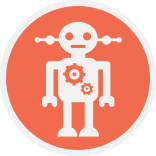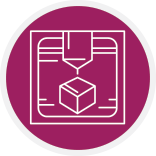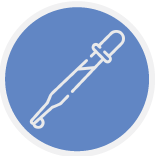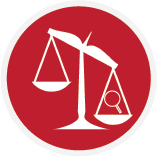Robotics is a fast-changing, highly interdisciplinary field. From health-care to manufacturing and customer service, the design and operation of robots is reshaping society and reimagining industries across the globe.
The MEng emphasis in Robotics is part of the University of Toronto Robotics Institute, which is home to the largest and most diversified robotics research program in Canada. Students will have the opportunity to collaborate with leading robotics experts from across the university around three research pillars: autonomous field robotics, health-care robotics and advanced manufacturing.
Students who complete the requirements of the emphasis will have it notated on their transcript.
Program Eligibility
Graduate students registered in the following MEng programs can specialize in the Robotics emphasis:
- Department of Mechanical & Industrial Engineering (MIE)
- University of Toronto Institute for Aerospace Studies (UTIAS)
- The Edward S. Rogers Sr. Department of Electrical & Computer Engineering (ECE)
You cannot apply to the emphasis directly as a standalone program. If you are a prospective student, you can learn more about applying to our MEng programs here.
Careers
Graduates who complete the Robotics emphasis are employed by companies in areas including:
- Aerospace
- Automation
- Finance
- Healthcare
- Manufacturing
- Retail
- Telecom
Some of the first roles our graduates secure are:
- Autonomy engineer
- Data scientist
- Hardware engineer
- Machine learning developer
- Process engineer
- Robotics engineer
- System engineer
Alumni Profiles

The MEng and the Robotics and Mechatronics emphasis strengthened my holistic understanding of core mechanical engineering concepts and their applications across other STEM fields, enabling me to build a career in the nuclear power and radiopharmaceutical industries. The projects, as part of several courses, were typically state-of-the-art industry problems that gave me professional experience in the academic setting.
Vedang Acharya, MEng graduate
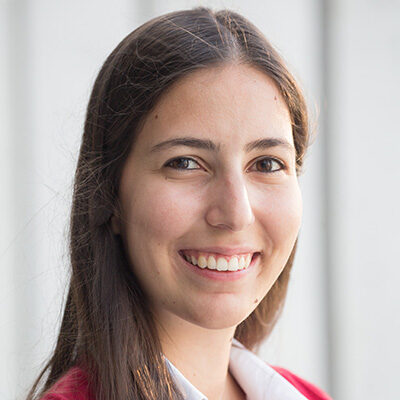
Integrating advanced robotics concepts with hands-on experience has allowed me to work on cutting-edge projects and develop a deep understanding of robotic systems, from fundamental theories to complex applications. As practical experience is often what sets candidates apart in the job market, the challenging projects I completed throughout my MEng degree have become invaluable assets.
Yesim Barista, MEng graduate
Emphasis Requirements
To complete an emphasis in Robotics, eligible students must successfully complete four courses (2.0 full-course equivalents – or “FCEs”) chosen from at least two course groups, and no more than two in any given group. Note that not all courses will be offered each year.
Pre-approved substitutions are listed below. Each student will only be allowed one substitution.
Some courses may satisfy the requirements of multiple emphases. Students may double-count a maximum of one course towards the requirements of any two emphases.
Students cannot earn more than two emphases.
Courses
Group 1 Planning and Control
- AER1516H: Motion Planning for Robotics
- AER1517H: Control for Robotics
- ECE557H: Linear Control Theory (Exclusion: ECE410H)
- ECE1619H: Linear Geometric Control Theory
- ECE1658H: Geometric Nonlinear Control of Robotic Systems
- ECE1636H: Control of Discrete-Event Systems I
- ECE1647H: Introduction to Nonlinear Control Systems
- ECE1653H: Hybrid Systems and Control Applications
- ECE1657H: Game Theory and Evolutionary Games
- MIE1064H: Control Methods with Applications To Robotics
- MIE1068H: Nonlinear Control
Pre-approved Group 1 substitutions
- ECE1635: Special Topics in Control I
- ECE1505: Convex Optimization
Group 2: Perception and Learning
- AER1513H: State Estimation for Aerospace Vehicles
- AER1515H: Perception for Robotics (Exclusion: ROB1514)
- CSC2503H: Foundations of Computer Vision
- CSC2506H: Probabilistic Reasoning
- CSC2515H: Introduction to Machine Learning
- CSC2541H: Topics in Machine Learning
- CSC2548H: Machine Learning in Computer Vision
- ECE516H: Intelligent Image Processing
- ECE1511H: Signal Processing
- ECE1512H: Digital Image Processing and Applications
- JEB1433H: Medical Imaging
- ROB501H: Computer Vision for Robotics
Pre-approved Group 2 substitutions
- STA2104: Statistical Methods for Machine Learning II
- ECE1513: Intro to Machine Learning (cannot substitute with CSC2515)
- CSC2606: Continuum Robotics
- MIE1077: Artificial Intelligence for Robotics III (AIR III): Advanced AI-Based Robot Applications
- ECE1508H: Special Topics in Communications: Applied Deep Learning
- ECE1508H: Special Topics in Communications: Reinforcement Learning
Group 3: Modelling and Dynamics
- AER506H: Spacecraft Dynamics and Control I
- AER1503H: Spacecraft Dynamics and Control II
- AER1512H: Multibody Dynamics
- MIE1001H: Advanced Dynamics
- MIE1005H: Theory of Vibration
- JEB1444H: Neural Engineering
Pre-approved Group 3 substitutions
- CSC2626: Imitation Learning for Robotics
Group 4: Systems Design and Integration
- AER525H: Robotics (Exclusion: ECE470H)
- AER1216H: Fundamentals of UAVs
- AER1217H: Development of Autonomous UAVs
- CSC2621H: Topics in Robotics
- ECE470H: Robot Modeling and Control (Exclusion: AER525H)
- MIE1070H: Intelligent Robots for Society
- MIE1071H: Advanced Robotics
- MIE1075H: AI Applications in Robotics
- MIE1809: Advanced Mechatronics
- MIE505H: Micro/Nano Robotics
- MIE506H: MEMS Design and Microfabrication
- ROB 521H: Mobile Robotics and Perception
- ROB 1514H: Introduction to Mobile Robotics
Pre-approved Group 4 substitutions
- MIE1050: Design of Intelligent Sensor Networks
- MIE1076: AI Applications in Robotics II
- MIE1080: Introduction to Healthcare Robotics
Faculty-level MEng emphases:
Questions?
For questions about course substitutions contact robotics.gradstudies@utoronto.ca. If you have questions related to program enrollment or course eligibility, contact the graduate advisor in your home department or institute.
For more information, visit the MEng emphases FAQ page »

